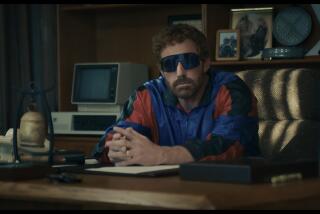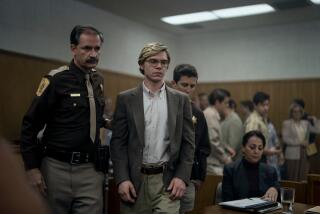Producer Asked to Pay if Show Offends
- Share via
NBC, in a move that pointedly illustrates the new financial reality in Hollywood, is seeking financial relief from the producers of the hit TV series “Quantum Leap” because of possible advertiser pullouts over a controversial upcoming episode about a gay teen-ager.
Already under pressure because of declining prime-time ratings and a weak advertising market, NBC asked “Quantum Leap” producer Universal Television to make changes in the episode. If Universal did not make the changes, NBC said the studio would be financially liable to cover some of what one executive estimated could be a loss of $1 million in advertising revenues.
The unusual move--believed to be the first of its kind ever taken by a network toward a producer--immediately provoked cries of censorship from public interest groups and TV producers, who contended that the networks are increasingly bending to advertiser pressure as they face dwindling revenues and mounting program costs.
“It’s an exposure of the myth that television is recession-proof,” said Barney Rosenzweig, executive producer of the CBS series “The Trials of Rosie O’Neill.” Rosenzweig said he has been getting a rising number of calls from network executives in recent months asking if he could soften language or other “problem” scenes.
“Advertisers who made commitments in the past and now want to get out are using the excuse of ‘content’ in the program,” Rosenzweig said. He said he will match funds raised by his writing staff to take out advertisements in the news media protesting what some see as a growing problem.
The action also drew immediate fire from the Gay & Lesbian Alliance Against Defamation and reignited the debate about advertisers supporting politically controversial programs.
“NBC is sending a message that gay characters, even gay teen-agers who exist in our society who are persecuted, are not wanted on NBC. If that’s the case, then the gay community doesn’t want NBC. We are going to tune out,” said Richard Jennings, executive director of GLAD’s Los Angeles chapter.
NBC’s move comes at a time when all three networks are publicly claiming that advertiser boycotts do not work. Only last month, the Network TV Assn. sent out thousands of letters to advertising agencies and their clients urging them to support controversial programs and not buckle to boycotting campaigns.
Don Bellisario, executive producer of “Quantum Leap,” said the subject of “liability” was raised at a meeting Wednesday night with NBC Entertainment executives in Burbank. At issue was a scene in the yet-to-be produced episode involving the suicide of a gay teen-age cadet at a military school.
In the episode, Sam, played by Scott Bakula, “leaps backward” to save the teen-ager and prevent his suicide. Bellisario said NBC executives were concerned about the effect the teen-ager’s suicide scene would have on advertising and sought revisions to the script.
Concern by a network over a program’s content has been voiced before, but Universal had already started pre-production on the episode, an unusual move because NBC had not yet signed off on the script, NBC executives said.
“We did not have time to assess the script,” said Sue Binford, a spokeswoman for NBC Entertainment. “We said you can go ahead and shoot this, but NBC is not prepared to accept any financial responsibility for this episode.”
NBC executives asked Bellisario what could be done “to reduce the liability,” the producer said, although the network did not seek direct compensation. According to one senior NBC executive who asked not to be identified, at one point it was mentioned that perhaps Universal might be able to step in with advertising for one of its future film releases.
Advertisers withdrawing their ads in programs that deal with controversial issues such as homosexuality and abortion are not new. ABC has lost advertising in episodes of “thirtysomething” that showed gay men in bed.
In addition, NBC had difficulty selling commercial time in “Roe Vs. Wade,” a miniseries last year about the landmark Supreme Court decision legalizing abortion. And several years ago, ABC could not find advertisers to support “The Day After,” a TV movie that graphically portrayed a nuclear war.
Bellisario said he made some slight revisions to the script and hopes that the episode will air later this season. He said similar problems have arisen in the past but haven’t involved a discussion of liability for lost advertising. He said that putting the “financial onus” on the producer for possible advertiser pullouts “won’t work.”
More to Read
The biggest entertainment stories
Get our big stories about Hollywood, film, television, music, arts, culture and more right in your inbox as soon as they publish.
You may occasionally receive promotional content from the Los Angeles Times.










